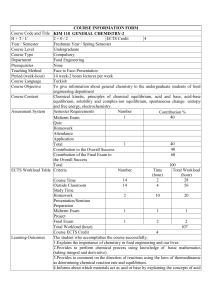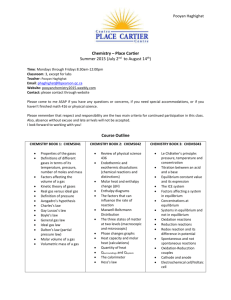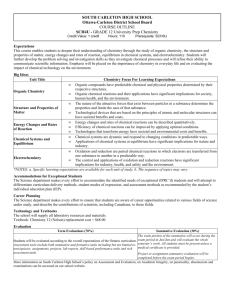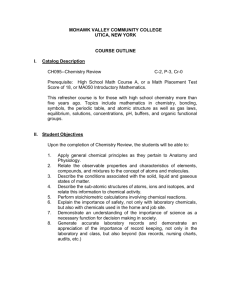Chemistry 12 Resource Exam A Exam Booklet
advertisement
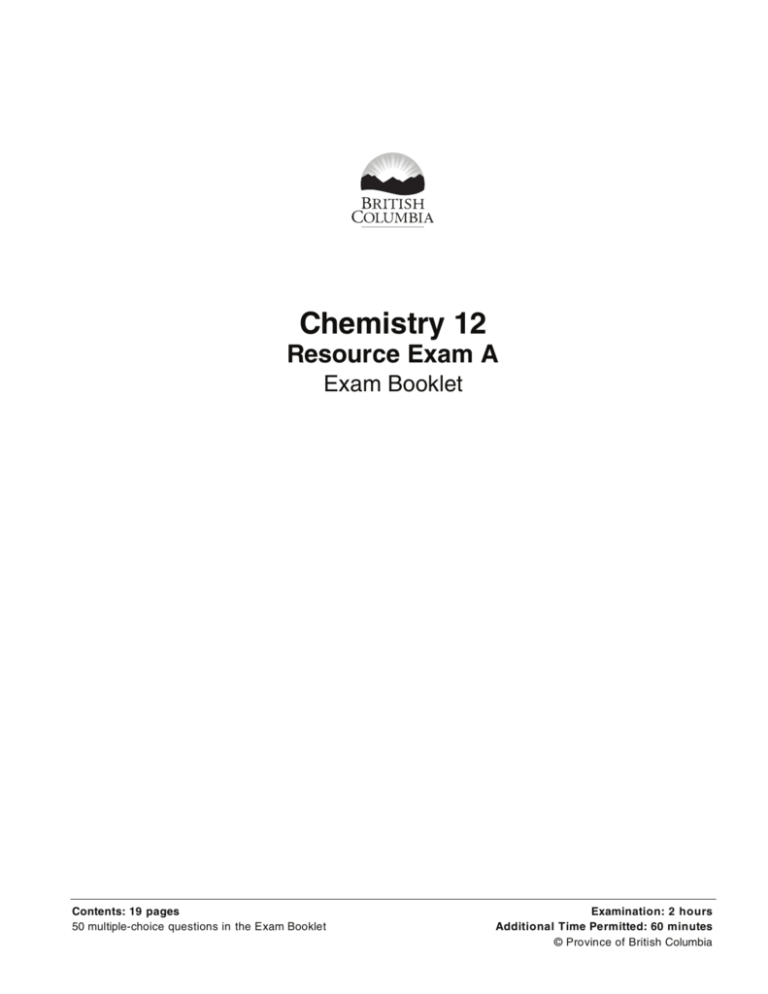
Chemistry 12 Resource Exam A Exam Booklet Contents: 19 pages 50 multiple-choice questions in the Exam Booklet Examination: 2 hours Additional Time Permitted: 60 minutes © Province of British Columbia PART A: MULTIPLE CHOICE Value: 62.5% of the examination Suggested Time: 80 minutes INSTRUCTIONS: For each question, select the best answer. 1. Solid sodium metal reacts rapidly with water in an open beaker to produce aqueous sodium hydroxide and hydrogen gas. A change in which of the following could be used to measure the rate of this reaction? A. B. C. D. the volume of the solution the pressure of the hydrogen gas the concentration of the solid sodium the mass of the beaker and its contents 2. Which of the following factors will increase the reaction rate of a heterogeneous reaction, but not of a homogeneous reaction? A. B. C. D. adding a catalyst increasing temperature increasing concentration increasing surface area Chemistry 12 – Resource Exam A Page 1 3. Which of the following could represent the relationship of activation energy to reaction rate? B. A. Ea Ea Rate Rate C. D. Ea Ea Rate Rate 4. Consider the following: I the electrolysis of water II the freezing of water III the melting of CuCl 2 IV the combustion of CH 4 Which of the above would have a negative Δ H value? A. B. C. D. Page 2 II only I and III only II and IV only I, III and IV Chemistry 12 – Resource Exam A 5. Consider the following reaction mechanism: Step 1: Step 2: H 2 O 2 + I − → H 2 O + IO − H 2 O 2 + IO − → H 2 O + O 2 + I − Which of the following is correct? Activated complex Catalyst A. H 2 O 2 IO − I− B. H 2O2 I − IO − C. IO − I− D. IO − O2 6. Consider the following equilibrium: ← PCl ( g ) PCl 3 ( g ) + Cl 2 ( g ) → 5 Initially, some PCl 3 and Cl 2 are placed in a flask. Which of the following describes what happens to the reverse reaction rate and to the pressure of the system as equilibrium is established? Reverse reaction rate Pressure A. increases increases B. increases decreases C. decreases decreases D. decreases increases Chemistry 12 – Resource Exam A Page 3 7. Consider the following system: ← 2NO ( g ) 2NO ( g ) + O 2 ( g ) → 2 Which of the following would indicate whether equilibrium had been established? A. [ NO ] > [ O 2 ] B. [ NO ] = 2 [ O 2 ] C. [ O2 ] = 2 [ NO ] D. [ NO ] is constant 8. Consider the following: ? energy + 6CO 2 ( g ) + 6H 2O ( ) → ← C6H12O6 ( s ) + 6 O 2 ( g ) Which of the following describes how enthalpy and entropy change in the forward direction? Enthalpy Entropy A. increases decreases B. increases increases C. decreases increases D. decreases decreases 9. Considering changes in enthalpy and entropy, which of the following will react completely? ? A. 2O3 ( g ) ← 3O 2 ( g ) → ? B. C ( s ) + 2H 2 ( g ) ← CH 4 ( g ) → ? C. 2SO 2 ( g ) + O 2 ( g ) ← 2SO3 ( g ) → ? D. C2 H 2 ( g ) + Ca ( OH )2 ( aq ) ← CaC2 ( s ) + 2H 2 O ( ) → Page 4 ΔH = −285 kJ ΔH = −74 kJ ΔH = −197 kJ ΔH = +183 kJ Chemistry 12 – Resource Exam A 10. Consider the following system at equilibrium: ← 2HCl ( g ) + I ( s ) 2HI ( g ) + Cl 2 ( g ) → 2 Which of the following describes the equilibrium shift and the change in the concentration of Cl 2 ( g ) when some I 2 ( s ) is added? Equilibrium shift [Cl 2 ] A. no shift no change B. left increases C. left decreases D. right increases 11. Consider the equilibrium system: N 2 ( g ) + 3Cl 2 ( g ) → ← 2NCl 3 ( g ) ΔH = + 460 kJ Which of the following describes what happens when some NCl 3 is added? Equilibrium Shift Value of K eq A. right remains constant B. right increases C. left remains constant D. left decreases Chemistry 12 – Resource Exam A Page 5 12. Consider the following equilibrium: ← 2BCl ( g ) + N ( g ) 2BN ( s ) + 3Cl 2 ( g ) → 3 2 K eq = 1.6 × 10 −3 Which of the following would be the value of K eq for the reaction: 3 ← BCl + 1 N BN ( s ) + Cl 2 → 3 2 2 2 A. 1.6 × 10 −3 B. 3.2 × 10 −3 C. 4.0 × 10 −2 D. 8.0 × 10 −4 13. The following equilibrium system was observed in a 1.0 L flask: ← 2Sb ( s ) + 3H S ( g ) Sb2S3 ( s ) + 3H 2 ( g ) → 2 K eq = 0.43 At equilibrium, there were 0.60 mol Sb2S3 , 1.10 mol H 2 and 0.80 mol Sb. What was the equilibrium [ H 2S] ? A. B. C. D. Page 6 0.57 M 0.81 M 0.83 M 1.5 M Chemistry 12 – Resource Exam A 14. Consider the equilibrium: ← 2NO ( g ) + Cl ( g ) 2NO 2 Cl ( g ) → 2 2 K eq = 0.56 If 0.80 mol NO 2 Cl , 0.32 mol NO 2 and 0.66 mol Cl 2 are placed in a 1.0 L container, which of the following describes what happens? A. B. C. D. The system proceeds left and [ NO 2 ] increases. The system proceeds left and [ NO 2 ] decreases. The system proceeds right and [ NO 2 ] increases. The system proceeds right and [ NO 2 ] decreases. 15. Which of the following will form a molecular solution when it is dissolved in water? A. CsCl B. CaC2 O 4 C. Cr ( NO3 )3 D. CH 3CH 2 OH 16. A 1.0 L sample of saturated solution was prepared at 25°C. The saturated solution was then allowed to evaporate at 25°C until 0.25 L of solution remained. The concentration of the saturated solution after evaporation was A. B. C. D. the same as before evaporation. 3 times lower than before evaporation. 4 times lower than before evaporation. 4 times higher than before evaporation. 17. Which of the following salts has a solubility less than 0.1 M ? A. FeCl 2 B. CaCl 2 C. FeSO 4 D. CaSO 4 Chemistry 12 – Resource Exam A Page 7 18. A solution contains the anions S2− and OH − . Which of the following compounds could be added to precipitate only one of these anions? A. Sr ( NO3 )2 B. Al ( NO3 )3 C. Zn ( NO3 )2 D. Mg ( NO3 )2 19. Consider the equation for a saturated solution of potassium chromate: ← 2K + ( aq ) + CrO 2− ( aq ) K 2 CrO 4 ( s ) + energy → 4 A concentration vs. time graph for a saturated solution of K 2 CrO 4 is shown below. Concentration (M) K+ CrO42– t Time What happened at time t? A. KNO3 was added to the system. B. K 2 CrO 4 was removed from the system. C. The temperature of the system was increased. D. The temperature of the system was decreased. Page 8 Chemistry 12 – Resource Exam A 20. Consider the following solubility equilibrium: 3− 2+ Sr3 ( PO 4 )2 ( s ) → ← 3Sr ( aq ) + 2PO 4 ( aq ) The K sp expression is A. K sp = [ Sr 2+ ] [ PO 4 3− ] 3 2 B. K sp = [ 3Sr 2+ ][ 2PO 4 3− ] C. K sp = [ 3Sr 2+ ] [ 2PO 4 3− ] 3 2 [3Sr 2+ ] [ 2PO43− ] = 3 D. K sp 2 [Sr3 ( PO4 )2 ] [ 21. A solution is found to contain a [Pb2 + ] of 0.10M . What is the maximum SO 4 2− ] that can exist in this solution before a precipitate forms? A. B. C. D. [ SO42 − ] [ SO42 − ] [ SO42 − ] [ SO42 − ] = 1.8 × 10 − 9 M = 1.8 × 10 − 8 M = 1.8 × 10 − 7 M = 1.3 × 10 −4 M 22. Which of the following general properties could be used to describe a basic solution? A. B. C. D. I conducts electricity II reacts with Na 2 CO3 to produce CO 2 III feels slippery III only I and III only II and III only I, II and III Chemistry 12 – Resource Exam A Page 9 23. Which of the following is a conjugate acid base pair? Acid Conjugate base A. NH 4 + NH 3 B. H 3O + OH − C. H 3PO 4 HPO 4 2− D. HPO 4 2− H 2 PO 4 − 24. Consider the following 1.0 M acid solutions: • H 2 CO3 • • HClO 4 H 3 C6 H 5 O 7 Rank the acid solutions in order of decreasing conductivity. A. H 3C6 H 5O 7 > H 2 CO3 > HClO 4 B. HClO 4 > H 2 CO3 > H 3C6 H 5O 7 C. H 2 CO3 > H 3C6 H 5O 7 > HClO 4 D. HClO 4 > H 3C6 H 5O 7 > H 2 CO3 25. Water reacts most completely as a base with which of the following? A. HSO3− B. H 3BO3 C. H 2PO 4− D. Al ( H 2 O )6 Page 10 3+ Chemistry 12 – Resource Exam A 26. Which species in solution will produce the greatest hydroxide ion concentration? A. F − B. H 2S C. PO 43− D. HPO 42 − 27. A base is added to water and a new equilibrium is established. The new equilibrium can be described by A. pH < pOH and K w = 1 × 10 −14 B. pH < pOH and K w < 1 × 10 −14 C. pH > pOH and K w = 1 × 10 −14 D. pH > pOH and K w > 1 × 10 −14 28. The ionization of water is endothermic. Which of the following could be correct if the temperature of water is decreased? Kw pH Classification A. decreases 7.1 basic B. increases 6.8 acidic C. decreases 7.1 neutral D. stays the same 7.0 neutral Chemistry 12 – Resource Exam A Page 11 29. Which of the following graphs describes the relationship between ⎡⎣ OH − ⎤⎦ and ⎡⎣ H + ⎤⎦ ? A. B. [OH– ] [OH– ] [H+] [H+] D. C. [OH– ] [OH– ] [H+] [H+] 30. Which of the following 0.10 M solutions of ions would have the highest pH? A. CN − B. NH 4+ C. SO 42 − D. Cr ( H 2 O )6 3+ Page 12 Chemistry 12 – Resource Exam A 31. Which of the following describes the relationship between base strength and K b value? Base Strength Kb A. increases increases B. increases decreases C. decreases increases D. decreases remains constant 32. The value of K b for HPO 4 2− is A. 1.6 × 10 −7 B. 4.5 × 10 −2 C. 6.2 × 10 −8 D. 2.2 × 10 −13 33. Which of the following 1.0 M solutions would have a pH greater than 7.00? A. HF B. KNO3 C. NH 4 Cl D. KCH 3COO 34. What is the pH at the transition point for an indicator with a K a of 2.5 × 10 −4 ? A. 1.00 B. 3.60 C. 7.00 D. 10.40 Chemistry 12 – Resource Exam A Page 13 35. Which of the following describes the predominant reaction in a solution of ( NH 4 )2 SO 4 with respect to hydrolysis? + 2− A. ( NH 4 )2 SO 4 ( aq ) → ← 2NH 4 ( aq ) + SO 4 ( aq ) B. + NH 4+ ( aq ) + H 2 O ( ) → ← H 3O ( aq ) + NH 3 ( aq ) C. − − SO 42 − ( aq ) + H 2 O ( ) → ← HSO 4 ( aq ) + OH ( aq ) D. No hydrolysis reaction occurs. 36. What is the pH of the solution formed when 0.085 moles NaOH is added to 1.00 L of 0.075 M HCl ? A. 2.00 B. 7.00 C. 12.00 D. 12.78 37. Which of the following graphs describes the relationship between the pH of a buffer and the volume of NaOH added to the buffer? B. A. pH pH Volume of NaOH added D. C. pH pH Volume of NaOH added Page 14 Volume of NaOH added Volume of NaOH added Chemistry 12 – Resource Exam A 38. A gas which is produced by internal combustion engines and contributes to the formation of acid rain is A. H 2 B. O3 C. CH 4 D. NO 2 39. A substance that is oxidized A. B. C. D. loses electrons and is a reducing agent. gains electrons and is a reducing agent. loses electrons and is an oxidizing agent. gains electrons and is an oxidizing agent. 40. What is the oxidation number change for C when C 6H12O6 is converted to C 2H5OH ? A. B. C. D. increase by 2 increase by 4 decrease by 2 decrease by 4 41. Consider the following redox equilibrium: X 2 + Y 2+ ← 2X − + Y 4+ → K eq = 6.2 × 10 −8 Which is the strongest oxidizing agent? A. X2 B. X− C. Y 4+ D. Y 2+ Chemistry 12 – Resource Exam A Page 15 42. Which of the following substances will react spontaneously? A. Cu 2+ and Cl − B. Au ( s ) and Cl − C. Au3+ and H 2 O 2 D. Cu 2+ and H 2 O 2 43. A titration of a FeSO 4 (aq) sample with acidified K 2 Cr2 O 7 ( aq ) produced the following results: Volume of FeSO 4 sample 10.0 mL Concentration of K2 Cr2O 7 0.278 M Volume of acidified K2 Cr2O 7 12.7 mL The equation for the overall reaction is: 6Fe 2+ + Cr2 O 72− + 14H+ → 6Fe 3+ + 2Cr 3+ + 7H 2 O [ ] in the sample? What is the Fe A. B. C. D. Page 16 2+ 0.0212 M 0.0588 M 0.353M 2.12 M Chemistry 12 – Resource Exam A Use the following electrochemical cell diagram to answer questions 44 and 45. Volts NO(g) lt bridge sa Sn(s) Pt(s) 1 M NaNO3 (acidified) 1 M SnSO4 44. The reaction occuring at the cathode is A. Na + + e − → Na B. Sn 2+ + 2e − → Sn C. NO3− + 4H + + 3e − → NO ( g ) + 2H 2 O D. 2NO3− + 4H + + 2e − → N 2 O 4 ( g ) + 2H 2 O 45. The cell potential at equilibrium is A. B. C. D. 0.00 V +0.94 V +0.96 V +1.10 V Chemistry 12 – Resource Exam A Page 17 46. Consider the following redox reactions and their corresponding cell potentials: 3Ce 4+ + Au → 3Ce 3+ + Au3+ E° = + 0.11 V Co3+ + Ce 3+ → Co2+ + Ce 4+ E° = + 0.21 V What is the reduction potential for Co3+ + e − → Co2+ ? A. B. C. D. +1.82 V +1.18 V + 0.32 V − 0.10 V 47. During the corrosion of magnesium, the anode reaction is A. Mg → Mg2+ + 2e − B. Mg2+ + 2e − → Mg C. 4 OH − → O 2 + 2H 2 O + 4e − D. O 2 + 2H 2 O + 4e − → 4 OH − 48. Why does the zinc coating on the inside of an iron soup can keep the iron from reacting with the soup? A. B. C. D. Page 18 Zinc is a weaker reducing agent than iron. Zinc is a weaker oxidizing agent than iron. Zinc is a stronger reducing agent than iron. Zinc is a stronger oxidizing agent than iron. Chemistry 12 – Resource Exam A 49. The molten salt, ZnCl 2 , undergoes electrolysis. The cathode reaction is A. Zn → Zn 2+ + 2e − B. Zn 2+ + 2e − → Zn C. Cl 2 + 2e − → 2Cl − D. 2Cl − → Cl 2 + 2e − 50. A metal spoon is to be electroplated with silver using a DC power supply. Which of the following is correct? Spoon Power supply connection A. anode positive terminal B. cathode positive terminal C. anode negative terminal D. cathode negative terminal This is the end of the multiple-choice section. Answer the remaining questions in the Response Booklet. Chemistry 12 – Resource Exam A Page 19



